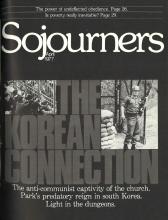It was already dark as we walked up to the front door of the red brick house, but warm light shone from the windows and we could hear laughter and cheerful banter inside. We knocked and almost immediately the door was opened by Taegun and Youngmi Moon.
They shouted excitedly to the others, “It’s Toast and Jam!” (Nicknames given thus by the children--Durst sounds like “toast” when pronounced in Korean and “jam” goes with toast.)
“Come on in and join the party!”
In the big front room, we joined in the fun with the rest of the “family”--about 15 in all, including six children and a high school girl. It wasn’t a special party, but one of those spontaneous things that sometimes just happens in the evening after supper (more often, perhaps, because they have no T.V.). Someone had made donuts which everyone was munching, a guitar and piano were accompanying songs on request, jokes were being shared and on-the-spot skits being performed, and finally we were all in the middle of the floor dancing--from the oldest of 50 years to the 2 year old baby.
This kind of evening is not unusual at the House of Daybreak, an intentional community in Seoul, Korea, started five years ago as an experiment in Christian living. Its founder is Dr. Moon Dong Whan (no relation to Moon Sun Myung of the Unification Church), or Stephen Moon, as many Western friends know him, and his wife, Faye, whom he met while studying at Hartford Seminary in Connecticut.
Read the Full Article

